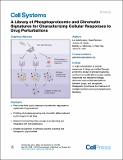A Library of Phosphoproteomic and Chromatin Signatures for Characterizing Cellular Responses to Drug Perturbations
Author(s)
Litichevskiy, Lev; Peckner, Ryan; Abelin, Jennifer G.; Asiedu, Jacob K.; Creech, Amanda L.; Davis, John F.; Davison, Desiree; Dunning, Caitlin M.; Egertson, Jarrett D.; Egri, Shawn; Gould, Joshua; Ko, Tak; Johnson, Sarah A.; Lahr, David L.; Lam, Daniel; Liu, Zihan; MacLean, Brendan X.; Lyons, Nicholas J.; Lu, Xiaodong; Mungenast, Alison; Officer, Adam; Natoli, Ted E.; Papanastasiou, Malvina; Patel, Jinal; Sharma, Vagisha; Toder, Courtney; Tubelli, Andrew A.; Young, Jennie Zin-Ney; Carr, Steven A; Golub, Todd; Subramanian, Aravind; MacCoss, Michael J.; Tsai, Li-Huei; Jaffe, Jacob D.; ... Show more Show less
DownloadPublished version (5.526Mb)
Terms of use
Metadata
Show full item recordAbstract
Although the value of proteomics has been demonstrated, cost and scale are typically prohibitive, and gene expression profiling remains dominant for characterizing cellular responses to perturbations. However, high-throughput sentinel assays provide an opportunity for proteomics to contribute at a meaningful scale. We present a systematic library resource (90 drugs × 6 cell lines) of proteomic signatures that measure changes in the reduced-representation phosphoproteome (P100) and changes in epigenetic marks on histones (GCP). A majority of these drugs elicited reproducible signatures, but notable cell line- and assay-specific differences were observed. Using the “connectivity” framework, we compared signatures across cell types and integrated data across assays, including a transcriptional assay (L1000). Consistent connectivity among cell types revealed cellular responses that transcended lineage, and consistent connectivity among assays revealed unexpected associations between drugs. We further leveraged the resource against public data to formulate hypotheses for treatment of multiple myeloma and acute lymphocytic leukemia. This resource is publicly available at https://clue.io/proteomics. A large compendium of cellular responses to drugs as profiled through proteomic assays of phosphosignaling and histone modifications reveals cellular responses that transcend lineage, discovers unexpected associations between drugs, and recognizes therapeutic hypotheses for treatment of multiple myeloma and acute lymphocytic leukemia. Keywords: mass spectrometry; proteomics; drug discovery; signaling; epigenetics; mechanism of action; LINCS project; GCP; P100; L1000
Date issued
2018-04Department
Broad Institute of MIT and Harvard; Massachusetts Institute of Technology. Department of Brain and Cognitive Sciences; Picower Institute for Learning and MemoryJournal
Cell Systems
Publisher
Elsevier BV
Citation
Litichevskiy, Lev et al., "A Library of Phosphoproteomic and Chromatin Signatures for Characterizing Cellular Responses to Drug Perturbations." Cell Systems 6, 4 (April 2018): P424-443.e7 © 2018 The Author(s)
Version: Final published version
ISSN
2405-4712